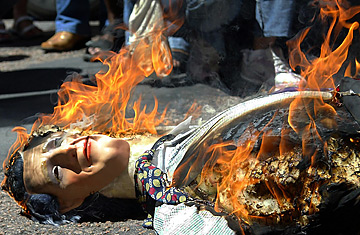
An effigy of George W. Bush is burned in Porto Alegre, Brazil, March 8, 2007. President Bush will visit Brazil on March 8-9.
But even Bush knows he can't simply ignore what's fueling that kind of negative feedback. So the question that hovers over the trip is whether Bush and Washington have finally learned to address all that anger in their own backyard. That resentment stems from both a widespread feeling that Bush — who came to office pledging to be Latin America's mejor amigo — instead essentially abandoned the region when it refused to line up behind his Iraq invasion, and a just as pervasive belief that Washington-backed capitalist reforms have helped widen the region's gap between rich and poor, the world's worst. Add to that the U.S.'s perceived obsession with hemispheric campaigns like the drug war, border fences and free-trade agreements instead of initiatives to improve health care, schools and small business development, and it's no surprise that Latin America's resurgent, Chavez-led left won seven of 11 presidential elections last year.
Fortunately, all indications are that the Administration has finally gotten the message. The major ethanol investment project that Bush will promote in Brazil with President Luiz Inacio Lula da Silva at least captures the spirit of what Latin Americans say they've been wanting from Washington for so long. That is, it's less about the abstractions of free trade — the fruits of which too rarely trickle down in Latin America's corrupt societies — and more about targeting specific development engines that may well create decent-paying jobs. The gesture may be too little too late to repair Bush's own frayed relations with the region, but it "helps lay the groundwork for a new, more engaged approach to Latin America that tries to redress the tremendous gap between what Washington cares about and what Latin Americans worry about," says Michael Shifter, vice president for policy at the Washington-based think thank Inter-American Dialogue.
The same can be said for the other small but nonetheless well-calculated initiatives Bush announced before heading south this week, like a regional health-care training center and a fund to underwrite home mortgages. Advocates in the region hope those sorts of new approaches will be just the start. In Mexico, advocates for the rural poor — hundreds of thousands of whom migrate illegally to the U.S. each year to work — insist there are myriad efforts the U.S. could aid to curtail the flow at its source, inside Mexico, instead of throwing billions at building walls along the border. One is the growing number of microcredit banks that help remote rural towns finance businesses. "If I could sit down with Presidents Bush and Calderon in Merida, I would say, 'Look, if you want to reduce illegal immigration then help us for once build a financial system where those migrants come from,'" says Isabel Cruz, director of the Mexican Association of Social Sector Credit Unions in Mexico City. "NAFTA [the North American Free Trade Agreement] frankly hasn't done it."
Not that free trade is a bad thing for Latin America by any means. Since NAFTA began in 1994, Mexican exports to the U.S. have leapt from $40 billion to almost $200 billion. The problem is that, at the same time, the richest 10% of Mexicans have seen their share of national income grow appreciably while that of the poorest 10% has declined. The reason: neither free trade nor the U.S. has done much to help Latin America build the kind of institutions, like adequate schooling or functioning judiciaries, that spread that wealth through the economic bloodstream.
The need for rule of law in Latin America, for example, should smack Bush squarely in the face when he visits U.S. allies Colombia and Guatemala this weekend. Scandals there — one involving Colombian senators allegedly in league with drug-trafficking paramilitary armies, and another implicating Guatemala's national police in the murder of three Salvadoran congressmen — are another harsh reminder that, despite what so many in Washington seem to think, elections alone don't constitute a democratic society.
Which is why one of Bush's least talked about proposals this week — a White House conference on building stronger civil institutions in Latin America — may well be the most important. The oil-rich Chavez can throw his multibillion-dollar largesse around the hemisphere, but he can't claim much of a reputation for spreading democratic institutions, and that's an area where the U.S. could build an advantage over the Caracas caudillo. Bush noted this week that too many Latin Americans "have seen little improvement in their daily lives, and this has led some to question the value of democracy." This tour alone can't fix that, of course. But if Bush can help diffuse some of the region's anger directed his (and Washington's) way, it would be a positive start.
